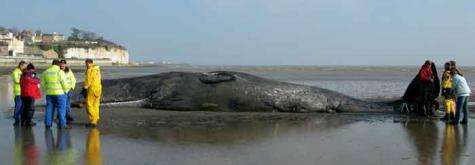ZSL scientists investigate sperm whale death

(PhysOrg.com) -- A 45ft (13.7m) sperm whale (Physeter macrocephalus) that was found stranded on a beach in Kent is believed to have died of starvation, indicate preliminary post-mortem results.
ZSL scientists carried out a full post-mortem on the juvenile male whale at Pegwell Bay as part of the Defra funded collaborative UK Cetacean Strandings Investigation Programme (CSIP), which is managed by ZSL.
Rob Deaville, project manager of the CSIP, says “Preliminary results from the post-mortem examination indicate that the whale had not fed for a long time, suggesting it had become dehydrated which most likely played a role in its live stranding. Further tests will now be carried out to determine the full picture”.
ZSL scientists liaised with the local coastguard, police and British Divers Marine Life Rescue (BDML) throughout the procedure. The team invited a TV documentary crew to film the post-mortem as part of an ongoing natural history series.
Strandings that undergo post-mortem examination provide a unique insight into causes of death, diseases, environmental contaminant levels, reproductive patterns, diet and other aspects of the general health of cetacean populations in the seas around our coasts, al. This provides important baseline data to help detect any future outbreaks of disease, unusual mortality events or responses to environmental change, all with a view to informing the long-term conservation status of cetaceans.
Information from the post-mortem examination will be added to a database on stranded cetaceans, which is managed by the CSIP and provides an essential resource for identifying factors which may cause cetaceans to strand, helping to prevent these events happening in the future.
Provided by Zoological Society of London
















